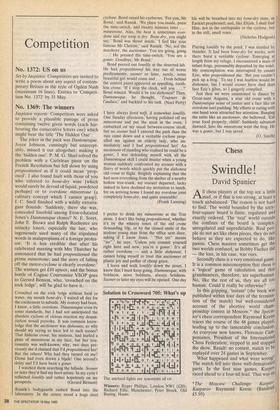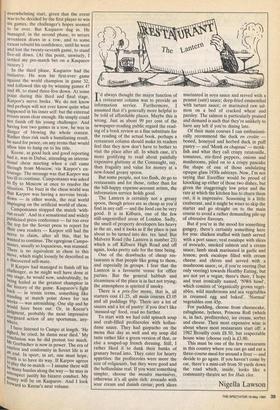Chess
Swindle!
David Spanier
A11 chess players at the top are a little mad, or if that is too strong, at least a touch unbalanced. The reason is not hard to find. The world bounded by the sixty- four-square board is finite, regulated and exactly ordered. The 'real' world outside the confines of the board is complex, unregulated and unpredictable. Real peo- ple do not act like chess pieces, they do not behave as they are expected to do, like pawns. Chess masters sometimes get the two worlds confused, as Bobby Fischer did — the loss, in his case, was ours.
Secondly chess is a very emotional game. It is a common misconception that chess IS a 'logical' game of calculation and that grandmasters, therefore, are superhuman. No, like the rest of us, they are all too human. Could it really be otherwise?
In this gripping, 'instant' (the book was published within four days of the terming' tion of the match) but well-considered account of the abortive world cham- pionship contest in Moscow,* the Specta- tor's chess correspondent Raymond Keene traces the course of the 48 games played, leading up to the lamentable conclusion. As everyone now knows, Florencio Cam' pomanes, President of the International Chess Federation, stepped in and stopped the show. Result: no contest, match to be replay&1 over 24 games in September.
What happened and what went wrong' The match fell into three well-demarcated parts. In the first nine games, KarPO' raced ahead to a four-nil lead. That was all
*The Moscow Challenge: Karpov- Kasparov Raymond Keene (Batsford £5.95) overwhelming start, given that the event was to.be decided by the first player to win six games; the challenger's hopes seemed to be over. But Kasparov dug in. He managed, in the second phase, to secure seventeen draws in a row, and to some extent rebuild his confidence, until he went and lost the twenty-seventh game, to stand five-nil down. (At this point, unwisely, I settled my pre-match bet on a Kasparov victory.)
In the third phase, Kasparov had the initiative. He won his first-ever game against the world champion in game 32, and followed this up by winning games 47 and 48, to stand three-five down. At some Point during this third and final stage, Karpov's nerve broke. We do not know and perhaps will not ever know quite what happened in his inner self: but the external events seem clear enough. He simply could not finish off his young challenger. And having lost two games in a row, he was in danger of blowing the whole contest. Rather than risk such a humiliating result, he sued for peace, on any terms that would allow him to hang on to his title.
Keene, as good luck and good reporting had it, was in Dubai, attending an interna- tional chess meeting when a call came through from Moscow, via Karpov's en- tourage. The message was that Karpov was too ill to continue. Campomanes was asked to fly to Moscow at once to resolve the situation. The buzz in the chess world was that Karpov was having a nervous break- down — in other words, the real world Impinging on the artificial world of chess. Campomanes stopped the match 'with- out result'. And in a sensational and widely Publicised press conference — far too over the top for the Soviet press to report for their own readers — Karpov still had the nerve to claim, after all this, that he wanted to continue. The egregious Campo- manes, usually so loquacious, was stunned. There is no equivalent in chess to this Move, which might loosely be described as a discovered self-mate.
If Karpov had managed to finish off his Challenger, as he might well have done at nY stage, he would now, undoubtedly, be being hailed as the greatest champion in the history of the game. something like back — in tennis terms, something like standing at match point down for ten weeks — was astonishing. One slip and he Would have been out. Or, in Keene's Judgment, probably the most impressive rearguard action of any sportsman, any- Where.
have listened to Campo at length. 'He sighed, he cried, he damn near died.' My conclusion was he did protest too much. Mr Gorbachev is now in power. The era of caution and conformity in Soviet life is at an end. In sport, in art, one must hope, Youth is to have its way. If Karpov agrees be Play the re-match — I assume there will .e many hassles along the way — he may in retrospect justify his bizarre conduct. My 'ufill°neY will be on Kasparov. And I look rvvard to Keene's next volume.















































 Previous page
Previous page